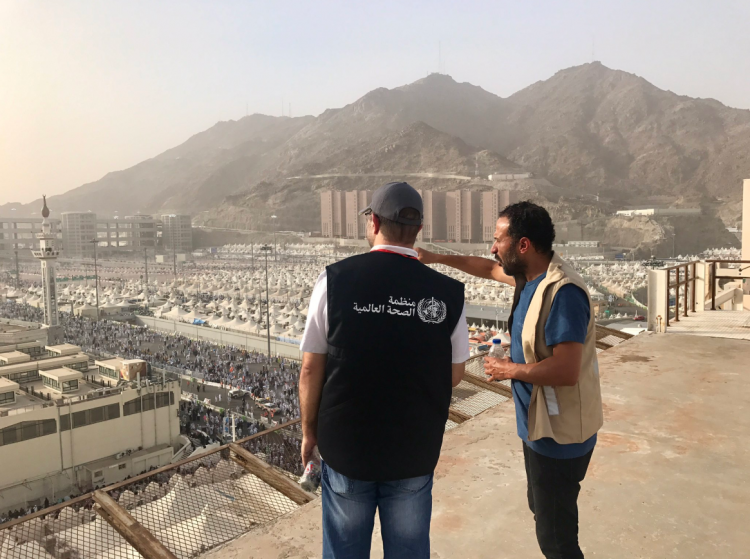 WHO (l) and Saudi Ministry of Health staff review the distribution of medical units along the way from Mina to Gamarat on the 4th day of the 2018 Hajj pilgrimage (Photo: Mona Yassin/WHO).
WHO (l) and Saudi Ministry of Health staff review the distribution of medical units along the way from Mina to Gamarat on the 4th day of the 2018 Hajj pilgrimage (Photo: Mona Yassin/WHO).
26 August 2018 - Last week, a total of 2.7 million muslim pilgrims passed through Saudi Arabia on the annual Hajj, one of the largest mass gatherings in the world and a key pillar of Islam. Thanks to the hard work by the Saudi Ministry of Health and the support of the World Health Organization (WHO), the 2018 Hajj passed without major incidents or outbreaks of infectious diseases.
During the seven-day, multi-city event, over 30,000 Saudi health workers provided support to pilgrims from 109 different countries at 25 hospitals and 155 primary health care centres around the holy sites of Islam. At the same time, pilgrims received health information in 67 different languages on how to prevent heat stroke, influenza, and other diseases, and Rapid Response Teams (RRTs) stood at the ready with 180 ambulances to provide urgent care.
New technology also played an increasing role in ensuring a healthy Hajj: a hotline responds to health emergency alerts and provides medical advices in four languages, while text messages with health advice enable pilgrims to avoid health risks and protect themselves and others.
As every year, preparations for Hajj started months ago, with WHO providing technical support to the Saudi Health Ministry, as well as training of health workers, and advice to the Saudi Ministry of Health. However, a new development in 2018 was the implementation of the Early Warning Alert and Response Network, piloting the system in 8 hospitals and 25 primary health care facilities in Mina and Muzdalifah.
The new surveillance system integrated with existing reporting systems to address public health threats like acute febrile illness, diarrhoea, respiratory infections, haemorrhagic fever, neurological diseases, food poisoning, heat-related illness and other unusual events. The new early warning system provided timely alerts of unusual health events to health authorities, who used updated response mechanisms to addressalert detected by the system. Health authorities were prepared to respond quickly and effectively to any public health emergency or outbreak alert.
As a result of the thorough preparations, piloting of EWARN, mobilization of sufficient health care staff and all other measures, Hajj 2018 passed without major incidents and in fact recorded a 12% decrease in the number of heat exhaustion cases and sunstroke among pilgrims compared to 2017. Dr Hany AbdelAziz Jokhdar, Deputy Minister for Public Health and the general supervisor of Hajj health committee this year: “The EWARN system detects any abnormal health event, any clustering of notifiable diseases in real time, while showing spatial distribution of clusters. This new system must now be expanded to cover all health facilities on the Hajj route.”
Dr Michel Thieren, Regional Emergency Director for WHO’s Regional Office for the Eastern Mediterranean, added: “Achieving an incident- and outbreak-free mass gathering of millions of people is daunting, but not impossible, as we have shown again this year. Our goal is to keep up this great result, by working together on continuous improvements in preparedness, surveillance systems like EWARN, and rapid response.”



